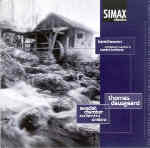It’s impossible any more to speak of a single “right way” to play Beethoven. In fact, there are at least four distinct styles, all of which are superbly represented on disc. First there is the traditional, “German” approach best exemplified by Daniel Barenboim’s recent outstanding cycle on Teldec. Next there is the lean and mean “classical” school of Toscanini, the most prominent recent cycle being Günther Wand’s for RCA. Osmo Vänskä’s terrific new Minnesota recording of Symphonies 4 and 5 also falls within this tradition, aided in no small degree by Jonathan Del Mar’s new critical edition of the scores. On period instruments we have the likes of Gardiner (Archiv) and Brüggen (Philips), while perhaps the most potentially intriguing performances now belong to the hybrid, “period practice on modern instruments” approach.
This last style has two subcategories: standard-size symphony orchestra (best exemplified by Mackerras on EMI and Norrington’s new cycle on Hänssler), and chamber orchestra. Among the latter, Thomas Dausgaard’s ongoing cycle for Simax remains far and away the best, combining absolutely sensational playing from the Swedish Chamber Orchestra Örebro with a real feel for Beethoven. This new recording of the “Pastoral” Symphony is a case in point. It’s fabulous. The textures seldom have sounded so transparent, with bass lines in perfect focus, and every touch of color cleanly audible. Listen, for example, to the contribution of the horns in the first movement, to the subtle woodwind doublings in the second and the wonderfully sensitive phrasing of the cellos, or to the lovingly accented drone bass figures that launch the finale. Dausgaard seems keen to wring every drop of rustic charm and character from the music.
The fourth-movement storm in some ways is the most fascinating of all, not as powerful as with a larger band, but somehow more graphic thanks to the rhythmic clarity of the basses and the exceptional care taken to keep all of the various string tremolos and figurations in focus. Other versions may be noisier, but this one has you believing not just in thunder, but in a genuine, drenching downpour. You really hear the rain. Then there are those marvelous oboes and bassoons in the scherzo–I could go on. Virtually every few bars brings some new revelation in terms of texture or rhythmic subtlety. The whole performance is a joy, not just as an exercise in virtuoso conducting and playing, but as a revelation of Beethoven’s expressive intentions.
In the three Leonore Overtures Dausgaard gives us a coupling that’s more than mere filler. I’ve always enjoyed having them all together, even though the greater thrust and polish of No. 3 does tend to cast a shadow over No. 2–but what makes these interpretations so enjoyable is their theatrical flair. Sure, the small string section can’t produce that whirlwind of sound that we expect from big orchestras at the end of No. 3, but check out the penetrating power of the winds and brass, and the rhythmic lift Dausgaard gives to the rising chromatic scale leading to the crunching climax just before the end. You really get the feeling of a pit orchestra playing an actual performance: there’s nothing formal or staid here. Typically, Simax also provides state-of-the-art engineering, making this as fine a Beethoven performance as we have any right to expect. What a spectacular series this is turning out to be! [1/3/2005]
































